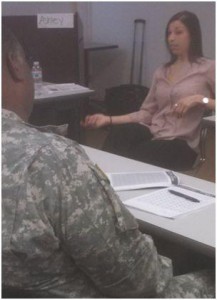By Alissa L. Bookwalter, CSF2 Training Center Liaison Officer to Warrior Transition Command

Ms. Ashley Jenkins, a CSF2 Training Center Master Resilience Trainer-Performance Expert (MRT-PE), covers “Hunt the Good Stuff” with a Ft. Belvoir WTB MRT.
Resilience skills are an integral part of the Army’s Warrior Care and Transition Program (WCTP) for wounded, ill and injured Soldiers. Warrior Transition Command (WTC) also uses resilience skills for Warrior Transition Unit (WTU) Families, Cadre and staff, ensuring that resilience training is offered at the unit level at all WTU’s – primarily though Master Resilience Trainers. Master Resilience Trainers (MRTs) are selected by their command staff to attend a two-week MRT training course conducted by Comprehensive Soldier and Family Fitness (CSF2).
Once a certified MRT returns to their WTU, they develop a unit resilience training program and conduct resilience training for local Soldiers, Families, Cadre and staff at least once per quarter. Local CSF2 Training Centers, staffed by CSF2 Master Resilience Trainers-Performance Experts (MRT-PEs), are available at the installation level to assist MRTs with training, resilience and performance enhancement skill refreshers and conducting two week MRT courses.
The Fort Belvoir Warrior Transition Battalion (WTB) recently conducted a Resilience Skills Refresher Workshop in conjunction with the National Capital Region (NCR) CSF2 Training Center. All Fort Belvoir WTB MRTs and command staff attended the workshop that provided additional skills training and practice-teaching on two of the most heavily utilized resilience skills in the WTU – “Hunt the Good Stuff” and “Goal Setting.”
“As an attendee and participant, I observed the true benefits of resilience refresher training,” said Fort Belvoir’s WTB Command Sgt. Maj. Clark Charpentier. “Leaders must provide opportunities to equip MRTs with the skills necessary to be a force multiplier within their organizations.”
Comprehensive Soldier and Family Fitness Training Center MRT-PEs covered “Goal Setting” and “Hunt the Good Stuff” with unit MRTs. After a brief refresher on the skills, the MRTs had the floor to demonstrate their knowledge and teaching abilities to the audience and Command team.
Michael Fairman, the National Capital Region CSF2 Training Center Manager noted that “keeping MRTs refreshed and engaged is critical to the success of the CSF2 program. As a CSF2 Training Center, we are equipped to provide MRTs with the tools that allow them to be successful.”
The Fort Belvoir WTB plans to continue Resilience Refresher Workshops once per quarter to keep unit MRTs current on skills.
For more information on CSF2 Training Centers and Resilience skills, please visit http://csf2.army.mil/index.html.


